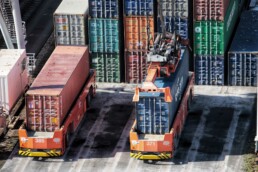Understanding the difference between FTL vs LTL shipping and which to choose for your business.
Understanding FTL vs LTL shipping is a big part of your overall fulfillment solution. The efficient transportation of goods is the primary aspect of what makes a good supply chain. This encompasses various considerations such as selecting the mode of transportation, choosing the right carrier, and ensuring cost-effectiveness. In road transportation, two prominent models prevail: Full Truckload (FTL) and Less than Truckload (LTL). These two methods have distinct characteristics and applications, making it essential for businesses to understand the differences and select the appropriate one for their shipments.

Understanding FTL and LTL
FTL, or Full Truckload shipping, is the ideal choice for transporting large shipments or goods that occupy the entire truck. This means the truck exclusively carries cargo from one company. Even if your shipment doesn’t fully utilize the truck’s capacity, you can still book the entire truck to ensure your goods travel without being mixed with other products.
On the other hand, LTL, which stands for Less than Truckload, involves one trailer carrying freight from multiple shippers, rather than a single company. LTL shipments are an excellent option for smaller businesses with fewer shipping requirements and budget constraints.
Exploring FTL and LTL Freight Shipping
FTL operates on a point-to-point distribution model. In this approach, the shipper loads their cargo onto the truck, which then travels directly to the final destination without stops. FTL is most suitable for bulk loads, shipments with special handling requirements, and more.
Conversely, LTL uses a hub-and-spoke distribution model. Smaller LTL shipments from multiple shippers are collected in a particular region and then combined onto one truck. This truck makes multiple delivery stops along the way to the final destinations.
Diving Deeper into the Differences
Several key differences set FTL and LTL shipping apart:
Cost: LTL is cost-effective when shipping a few pallets at a time, as you only pay for the space you use. FTL, however, involves booking an entire truck, which can be more expensive, especially for smaller shipments.
Transit Time: FTL offers predictable transit times since the truck carries shipments from one shipper only. In contrast, LTL shipments may have variable delivery times due to multiple stops and less fixed schedules.
Safety of Goods: LTL shipments may involve loading and unloading several times, potentially increasing the risk of damage. FTL, with its direct route, ensures the safety of goods in transit.
Advantages of FTL and LTL
Both FTL and LTL shipping offer unique advantages. LTL is ideal for cost-conscious shippers with smaller loads, while FTL guarantees on-time deliveries and suits high-value or sensitive cargo.
When to Use FTL vs LTL Shipping
The choice between FTL and LTL depends on various factors, including shipment size, weight, type, delivery time, and budget. Small businesses with budget constraints often opt for LTL, while FTL is preferred for high-value and time-sensitive shipments.
Selecting a 3PL for FTL and LTL Service
When selecting a 3PL (Third-Party Logistics) provider for FTL or LTL services, consider the following:
- Expertise and experience in handling your specific goods or shipments.
- Balancing cost and delivery time.
- Visibility and technology platforms for shipment management.
Beginner’s Guide to Third-Party Logistics (3PL)
The world of e-commerce is always changing, therefore understanding the roll of Third-Party Logistics is integral to keeping up. In light of this our beginner’s guide to third-party logistics (3PL) will delve into the essential aspects, offering insights into fulfillment services, warehousing, and much more.
Read More…
Understanding the differences between Full Truckload (FTL) and Less than Truckload (LTL) shipping methods is essential for efficient transportation planning. Your choice should align with your specific shipment needs, and selecting the right 3PL partner can further streamline your logistics operations. Whether you opt for FTL, LTL, or other shipping options, a well-informed decision ensures cost-effective and reliable transportation for your business.
Understanding the difference of these transportation methods is paramount to your success. Let Falcon help you with your fulfillment and we will help you succeed .
Let’s Talk!





